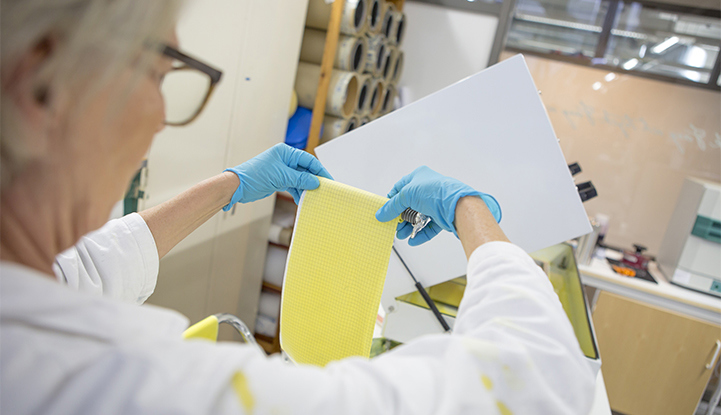Sustainable research highlighted on prestigious list
2020-03-04

A total of 94 research projects from 27 universities have been selected, two of which were from the University of Borås.
The textile industry is one of the world's most resource-intensive and polluting industries. Although large amounts of water, chemicals, and energy are required to dye textiles, Ellinor Niit, a researcher as well as Lecturer at the Swedish School of Textiles, and who has extensive experience in the textile industry, saw that the industry continued doing the same old things.
"It's something I've been thinking about for a long time. Lots of really unnecessary chemicals are purchased and large pools are filled with wastewater that is then discharged by factories every day. It is common for a third of the batches to be incorrect due to poor accuracy in the colouring process. Why do the machines still look like they did 40 years ago, even though we know what needs to be done? It surprises me," says Ellinor Niit.
Big wins for the environment and the economy
She began sketching out what a process might look like, which led to the dyeing machine FlexDyer. Instead of bathing the textiles in dye baths, precisely as much dye as is needed is sprayed directly onto the fabric with something similar to a digital printer. Additionally advantages of FlexDyer are that it is adapted to be able to dye small batches and meet the need for fast, flexible production. "The results were better than I anticipated and the interest from the outside world has been huge," says Ellinor Niit.
It is about big wins for both the environment and the economy. FlexDyer reduces the use of water, chemicals, and energy by 90 per cent. Wastewater is reduced by 99 per cent, and depending on the class of dye, up to 30 per cent of the dye can be saved.
"A small dye house spends maybe half a million Swedish crowns just on buying the chemicals needed in addition to the dyes themselves. These chemicals that are needed in conventional machines just end up going down the drain," says Ellinor Niit.
During the project, she came into contact with Joacim Wellander and Per Stenflo, who have extensive experience in leading positions in international companies. They saw the potential to commercialise the idea and worked to obtain capital and investors, which ended up being the start of Imogo AB in autumn 2018. Ellinor Niit has recently left her position at the Swedish School of Textiles in order to spend all her time on FlexDyer, but she has retained her connection to the university through a business innovation project within Smart Textiles. She hopes that there can be continued collaboration in the future as there are many ideas that can further develop the process to be a closed complete system with no emissions.
The dyeing of textiles is a complicated process and no two fibres or constructions are alike.
"We don't have the solution to everything, but for relatively many materials, we can already offer a functioning technology. We believe we will have received our first order by this summer," says Ellinor Niit.
Solution for one billion women
Another innovation developed at the University of Borås is Spacerpad, a smartly designed sanitary pad that can be reused and washed with very little water.
Today, somewhere between a half billion to a billion women lack the opportunity to manage their menstruation in a hygienic and safe way. Lack of money and good laundering facilities as well as taboos around menstruation leave many women in the world excluded from society when they menstruate.
Another problem is the large amount of waste that disposable pads and tampons create. A woman uses an average of 11,000 sanitary products over the course of her life, which usually consist of non-renewable absorbers. Spacerpad looks and feels like a regular pad, but instead of the liquid being absorbed into the textile fibres, it settles between the fibres. This construction holds the liquid, which is then easily rinsed out with a little water. The sanitary pad dries quickly and is hygienic.
Karin Högberg is a researcher as well as Project Leader for Spacerpad, which was recently granted SEK 10 million by Vinnova. The first tests with Spacerpad began a year ago when women in Kenya had the opportunity to test the pad; the results were promising. A few weeks ago, the project members were back in Kenya to follow up on the results and meet with UN agency UNFPA and the company that will be able to put Spacerpad into production. Over the next few years, the project will focus on collaboration, product development, and testing on a larger scale.
"We are now moving forward with greater determination. Demand is high and many people have been getting in touch with questions. Everything from when and where to buy the sanitary pads to collaboration requests," says Karin Högberg.
About the 100 list
The 100 list is issued by the Royal Swedish Academy of Engineering Sciences in order to highlight the need for researchers and companies to find each other and collaborate on societal challenges.
"By building bridges between academia and business, we give research that has the potential to change the world more opportunities to translate their work into practical benefits and increased Swedish competitiveness," says Tuula Teeri, CEO of IVA.
The 94 research projects lifted on the 100 list have undergone a review after being nominated and were selected as they create value for companies or society in terms of knowledge, processes, products, and business development.
Read more
Text: Lina Färm
Photo: Suss Wilén (setting photo and portrait of Karin Högberg), Marc Hermansson (portrait of Ellinor Niit)
Translation: Eva Medin

